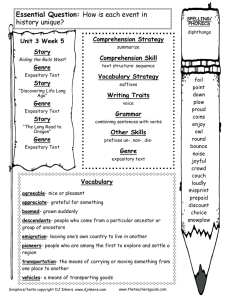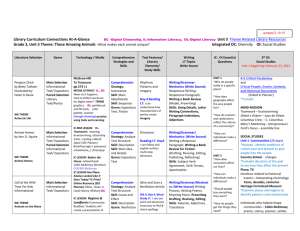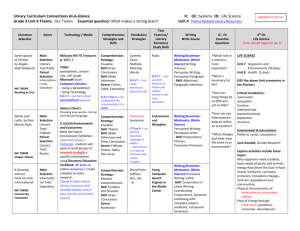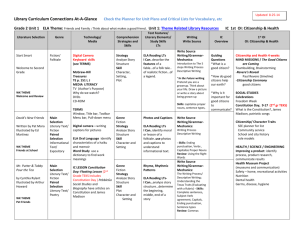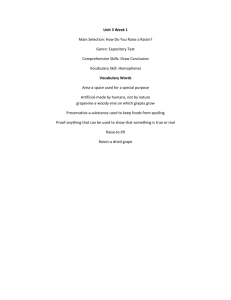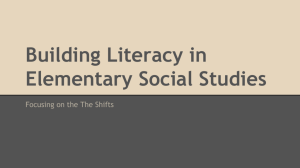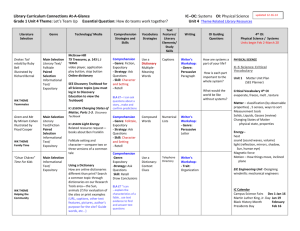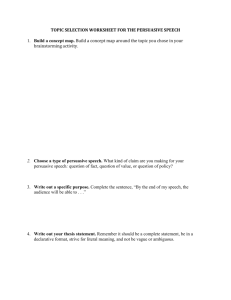Library Curriculum Connections At-a
advertisement
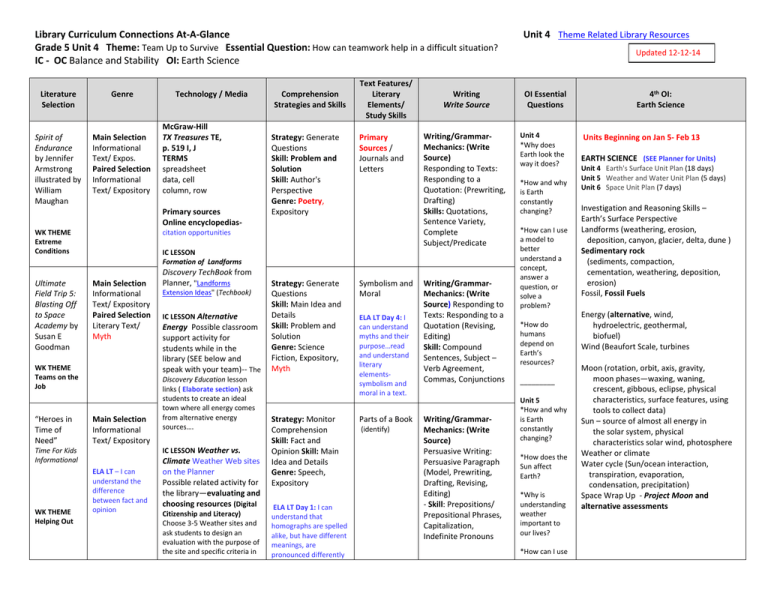
Library Curriculum Connections At-A-Glance Grade 5 Unit 4 Theme: Team Up to Survive Essential Question: How can teamwork help in a difficult situation? IC - OC Balance and Stability OI: Earth Science Literature Selection Genre Spirit of Endurance by Jennifer Armstrong illustrated by William Maughan Main Selection Informational Text/ Expos. Paired Selection Informational Text/ Expository Technology / Media McGraw-Hill TX Treasures TE, p. 519 I, J TERMS spreadsheet data, cell column, row Primary sources Online encyclopedias- WK THEME Extreme Conditions Ultimate Field Trip 5: Blasting Off to Space Academy by Susan E Goodman Primary Sources / Journals and Letters Writing Write Source Writing/GrammarMechanics: (Write Source) Responding to Texts: Responding to a Quotation: (Prewriting, Drafting) Skills: Quotations, Sentence Variety, Complete Subject/Predicate IC LESSON Formation of Landforms Main Selection Informational Text/ Expository Paired Selection Literary Text/ Myth Main Selection Informational Text/ Expository Discovery TechBook from Planner, "Landforms Extension Ideas" (Techbook) IC LESSON Alternative Energy Possible classroom support activity for students while in the library (SEE below and speak with your team)-- The Discovery Education lesson links ( Elaborate section) ask students to create an ideal town where all energy comes from alternative energy sources…. IC LESSON Weather vs. Time For Kids Informational WK THEME Helping Out Strategy: Generate Questions Skill: Problem and Solution Skill: Author's Perspective Genre: Poetry, Expository Text Features/ Literary Elements/ Study Skills citation opportunities WK THEME Teams on the Job “Heroes in Time of Need” Comprehension Strategies and Skills ELA LT – I can understand the difference between fact and opinion Climate Weather Web sites on the Planner Possible related activity for the library—evaluating and choosing resources (Digital Citizenship and Literacy) Choose 3-5 Weather sites and ask students to design an evaluation with the purpose of the site and specific criteria in Strategy: Generate Questions Skill: Main Idea and Details Skill: Problem and Solution Genre: Science Fiction, Expository, Myth Strategy: Monitor Comprehension Skill: Fact and Opinion Skill: Main Idea and Details Genre: Speech, Expository ELA LT Day 1: I can understand that homographs are spelled alike, but have different meanings, are pronounced differently Symbolism and Moral ELA LT Day 4: I can understand myths and their purpose…read and understand literary elementssymbolism and moral in a text. Parts of a Book (identify) Writing/GrammarMechanics: (Write Source) Responding to Texts: Responding to a Quotation (Revising, Editing) Skill: Compound Sentences, Subject – Verb Agreement, Commas, Conjunctions Writing/GrammarMechanics: (Write Source) Persuasive Writing: Persuasive Paragraph (Model, Prewriting, Drafting, Revising, Editing) - Skill: Prepositions/ Prepositional Phrases, Capitalization, Indefinite Pronouns Unit 4 Theme Related Library Resources Updated 12-12-14 OI Essential Questions Unit 4 *Why does Earth look the way it does? *How and why is Earth constantly changing? *How can I use a model to better understand a concept, answer a question, or solve a problem? *How do humans depend on Earth’s resources? _________ Unit 5 *How and why is Earth constantly changing? *How does the Sun affect Earth? *Why is understanding weather important to our lives? *How can I use 4th OI: Earth Science Units Beginning on Jan 5- Feb 13 EARTH SCIENCE (SEE Planner for Units) Unit 4 Earth's Surface Unit Plan (18 days) Unit 5 Weather and Water Unit Plan (5 days) Unit 6 Space Unit Plan (7 days) Investigation and Reasoning Skills – Earth’s Surface Perspective Landforms (weathering, erosion, deposition, canyon, glacier, delta, dune ) Sedimentary rock (sediments, compaction, cementation, weathering, deposition, erosion) Fossil, Fossil Fuels Energy (alternative, wind, hydroelectric, geothermal, biofuel) Wind (Beaufort Scale, turbines Moon (rotation, orbit, axis, gravity, moon phases—waxing, waning, crescent, gibbous, eclipse, physical characteristics, surface features, using tools to collect data) Sun – source of almost all energy in the solar system, physical characteristics solar wind, photosphere Weather or climate Water cycle (Sun/ocean interaction, transpiration, evaporation, condensation, precipitation) Space Wrap Up - Project Moon and alternative assessments Literature Selection Genre Technology / Media Zathura by Chris VanAllsburg Main Selection Literary Text/ Science Fict. Paired Selection Informational Text/ Expository mind. Resulting data may be collected on spreadsheets & graphed for presentation or “How Do you Cite This?” Use a fascinating weather shot like the Dec 9 Mike Alvstad fog photo of downtown Dallas to teach correct citation.. ELA Computer Literacy: Using and Formatting Spreadsheets Media Literacy: - Writing a formal email WK THEME Family Teams IC LESSON Earth, Sun, Moon Skunk Scout by Laurence Yep Illustrated by Winson Trang Main Selection Literary Text/ Fiction Paired Selection Informational Text/ Persuasive WK THEME Camping Out Show What You Know WK THEME Review and Assess Test Practice Literacy Activities Comprehension Word Study, Writing, Drama, Genre Study System (Explore) Discovery Techbook, Sciencesaurus , related publishers print title: Somewhere in the World (Schuett) IC LESSON Space Wrap Up NASA websites on Planner, Speak to your team about Classroom assignment-Project Moon -It may be a summative assessment – This lesson has been presented with support for ELL and a variety of options (Students research and prepare a proposal /brochure to persuade travelers to visit. Alternative activities include writing a sci fi story about the Sun, creating a skit, comic strip, TV broadcast, compare and/or contrast soil of Earth and Moon, or research to extend knowledge Comprehension Strategies and Skills Strategy: Monitor Comprehension Skill: Draw Conclusions Skill: Fact and Opinion Genre: ExpositoryScience Fiction Text Features/ Literary Elements/ Study Skills Toolbar and Link LT Day 1: I can.. understand that analogies compare two things…use synonyms to show how two things are related Strategy: Monitor Comprehension Skill: Character and Setting Skill: Draw Conclusions Genre: Biography, Fiction, Expository Interview ELA LT -I can support my ideas with text evidence when discussing them with other Writing Write Source Writing/GrammarMechanics (Write Source): Persuasive Writing: Persuasive Essay (Prewriting, Drafting) Skills: Transition Words, Irregular Words, Irregular Verbs, Active Voice, Adverbs Writing/GrammarMechanics: (Write Source) Persuasive Writing: Persuasive Essay: (Revising, Editing) Skills: Transition Words, Adjective Forms, Collective Nouns ELA LT Day 2: I can draw conclusions about a character’s feelings by paying attention to dialogue and actions in a story. Review/Assess Problem/Solution Main Idea & Details Fact/Opinion Draw Conclusions Character/Setting ELA LT Day 1: I can present and evaluate an oral report. McGraw–Hill TexasTreasures, TE Grade 5; Plano ISD Elementary ELA Planner, IC Planner, WriteSource Review/Assess Primary Sources Symbolism & Moral Parts of a Book Toolbar & Link Interview Writing/GrammarMechanics: (Write Source) Persuasive Writing: Publishing; Persuasive Writing Across the Curriculum; Persuasive Writing for the Texas Assessment Skills: Letter Writing Conventions, Colons, Review Unit Skills OI Essential Questions a model to better understand a concept, answer a question, or solve a problem? 4th OI: Earth Science Texas Bluebonnet Award voting deadline midnight, Jan 31st: http://txla.org/TBA-voting _________ Unit 6 *How and why do we observe patterns, cycles and systems in our solar system? IC Calendar Campus Science Fairs MLK, Jr. Day Black History Month Presidents Day *Why is the Sun important to Earth? Units Beginning Feb 16 – April 24 LIFE SCIENCE, STAAR REVIEW *How might technology help expand our knowledge of our solar system? *How can I use models and/or data to better understand a concept, answer a question, or solve a problem? Dec 1-Jan 16 Jan 19 February Feb 16 Unit 7 Organisms and Environments (30 days) Unit 8 STAAR Problem Solvers (10 days) Unit 9 Health (5 days)
